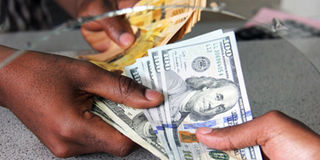Forex reserves increase by Shs584b

A trader exchanges Shillings for dollars. Bank of Uganda says the country’s foreign exchange reserves grew by $230 million in the last four months. FILE PHOTO
What you need to know:
Currency strength. Country calculates, keeps funds in US Dollars.
Kampala- Uganda’s foreign exchange reserves have increased by $230 million (about Shs584 billion) over the last four months.
This, according to Bank of Uganda (BoU), is an equivalent of 4.4 months of future imports of goods and services.
This is the highest level in terms of volume of foreign exchange reserves in import cover in the recent years.
“The stock of Uganda’s foreign exchange reserves at the end of February 2014 amounted to $3.276 billion, which is an increase from $2.046 billion at end of November 2013,” the executive director of research BoU, Dr Adam Mugume, told the Daily Monitor in an interview recently.
Bank of Uganda uses the foreign exchange reserve to intervene in the domestic money market to bring about stability when there are volatilities in the foreign exchange market, which can either be the appreciation or depreciation of the Uganda shilling against the United States (US) dollar.
Uganda calculates and keeps all her foreign exchange reserves in US dollars.
Stabilising economy
The international requirements, set by the International Monetary Fund, requires developing countries to have foreign exchange reserve cover which can at least cover three months of imports of goods and services.
This, coupled with the policy of building the country’s reserve levels to withstand any external economic shocks, BoU sometimes buys the US dollars from the domestic money market to build the reserve levels as the economic conditions in the market allows.
The US dollar remains the global official foreign exchange currency for most countries and most commodities are traded in US dollar terms.
Speaking about the performance of the of US dollar, Dr Mugume said in March the US Dollar weakened against major world currencies. For instance, it depreciated by 0.7 per cent on month to month basis and it depreciated by 3.3 per cent on year to year basis, largely due to gains made by the Euro owing to the Euro Zone’s positive economic performance.
The Dollar is however expected to strengthen as the global economic environment improves.




